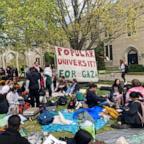Court: Convicts don't have right to evidence
WASHINGTON -- Prisoners have no constitutional right to biological evidence for DNA testing, the Supreme Court ruled Thursday. The 5-4 decision does not affect prisoners' efforts under state laws but rather rejects any federal right to evidence to try to prove innocence.
The dispute from Alaska centered on the modern testing technology that has led to the exoneration of more than 200 individuals. The Innocence Project, which represented the convicted rapist in the case, expressed disappointment in the ruling yet said it is unlikely to slow the momentum among inmates nationwide trying to win exoneration with DNA under state laws.
Forty-seven states have some laws allowing access to crime scene evidence, as does the federal government. These statutes vary widely. Some, including the federal law, require a prisoner to sign an affidavit attesting to his innocence with the request.
The question was whether constitutional due process of law guarantees a convict access to a state's biological evidence.
In saying no, Chief Justice John Roberts, writing for the majority, acknowledged that DNA testing "has an unparalleled ability both to exonerate the wrongly convicted and to identify the guilty." Yet he said inmates' access to such evidence — in this situation from a rape case — was a matter best left to the states.
The case split along familiar ideological lines. Dissenting justices said the court majority was rejecting a route that could "ascertain the truth once and for all."
William Osborne was charged with the 1993 kidnapping and sexual assault of a woman who was raped, beaten, buried in snow and left for dead.
Osborne's lawyer decided to forgo independent DNA testing of the state's biological evidence. Alaska officials said Osborne had no right to try to obtain the evidence more than a decade after the crime and when he had admitted guilt at a parole hearing.
The U.S. Court of Appeals for the 9th Circuit, hearing Osborne's appeal, had ruled that he did have a right to the evidence.




